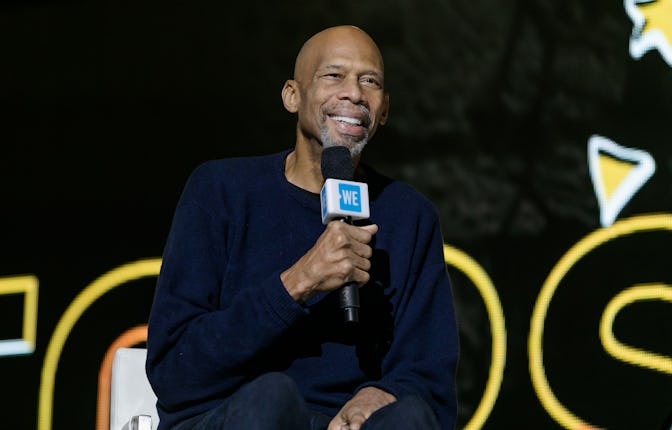Kareem Abdul-Jabbar isn’t a fan of LeBron’s memes
The basketball legend wrote a lengthy essay criticizing LeBron’s use of his platform in response to COVID.

Kareem Abdul-Jabbar is disappointed in LeBron James. After a recent Instagram post from James of the Spiderman meme indicating confusion between COVID, the common cold, and the flu, Abdul-Jabbar chided the basketball superstar, calling it a “blow to his worthy legacy” in a detailed essay.
James’s post, captioned with the message “Help me out folks,” appeared to be intended as a joke as the Omicron variant has surged rapidly across the country during the holiday. But in an essay on his Substack, Abdul-Jabbar, a basketball legend who has for decades been vocal as a social and political activist, went in detail about his displeasure with James’s public response to COVID thus far. Namely, Abdul-Jabbar frames the meme as part of a larger issue of impassivity he sees in James’s relationship to vaccine information.
“I don’t talk about other people and what they should do,” James, who is vaccinated, said in September about telling others to get the jab. “We’re talking about individual bodies. We’re not talking about something political or racism or police brutality. I don’t think I personally should get involved in what other people do for their bodies and livelihoods ... that’s not my job.”
Referencing James’s stance from earlier this year, Abdul-Jabbar methodically picked apart what he not only sees as James’s absolution of responsibility with his outsized platform, but also his contradictory belief that the pandemic is separate from racism. A mirror for various social inequities, COVID cases and deaths, Abdul-Jabbar noted, has affected the Black community at a rate higher than any other racial group. “One way to help the Black community to overcome their hesitancy and save lives is for prominent Black celebrities and influencers to continue to encourage everyone to get vaccinated and their boosters,” he wrote.
The post, a detailed censure against a global icon, is unsurprising coming from Abdul-Jabbar, who has consistently shown himself to be a levelheaded voice of reason who is unafraid to speak out and criticize where he sees wrong. It is also a revealing example of the dichotomy between the kind of activist Abdul-Jabbar is and the kind that LeBron — whose often well-placed politics are arguably tempered by his keen awareness of himself ultimately as a product of many corporate interests — perhaps falsely sees himself as, though that is a conversation for another day.
James said he “didn’t have a response to Kareem at all” when asked about Abdul-Jabbar’s post. “And if you read the post and you read the tag, you know that I’m literally, honestly, asking, ‘Help me out.’ Help me kind of figure it all out, like we’re all trying to figure this pandemic out,” he said.
Abdul-Jabbar, undoubtedly, would expect more out of James. The tone from Abdul-Jabbar’s post was ultimately one of earnest urgency from an elder statesmen who, rather than framing an attack (Kareem opens the piece by praising LeBron), is imploring someone he respects to use his reputation for good and take his responsibility more seriously.
In essence, if LeBron has shown himself to be someone who has refuted the notion of “shut up and dribble” and advocated instead to take on the mantle of using his stardom to speak out against injustice, he ought to do it now — amid a pandemic that has only made naked and exacerbated the same inequities he has historically stood against. “While LeBron is a necessary and dynamic voice critical of police brutality against the Black community, he needs to be the same necessary and dynamic advocate with vaccines, which could save thousands of Black lives right now,” Abdul-Jabbar wrote. “The racism is just as real — and just as lethal — in both cases.”